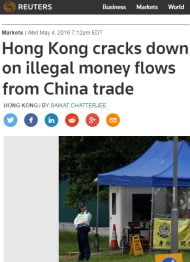Somebody up in Beijing has noticed that Hong Kong’s parasite economy does not necessarily serve the national interest. Reuters reports that our local authorities have been motivated into clamping down on ‘fake trade-invoicing’ – a euphemism for lying to  Customs about the value of goods crossing the border. In effect, it enables Mainland-based companies to move cash out of (or for that matter into) the country in breach of capital controls.
Customs about the value of goods crossing the border. In effect, it enables Mainland-based companies to move cash out of (or for that matter into) the country in breach of capital controls.
The practice has been going on for decades. It is the respectable grown-ups’ version of channeling funds out through Macau’s casinos. The hordes who smuggle milk powder and Yakult from Sheung Shui to Shenzhen – and who deposit endless little bundles of cash in Hong Kong banks every day – are engaged in a related activity, on a tiny scale.
It sounds better if you call it ‘leveraging arbitrage opportunities’, but what it means is that clean, law-abiding Hong Kong facilitates the breaking of Mainland laws, while Mainland law enforcement and government look the other way. The Chinese regime’s own members and supporters need a way round the restrictions they impose on the masses. Now Xi Jinping has decided that fighting capital flight is more important (this comes soon after other measures, like barring Mainlanders from buying Hong Kong insurance policies).
Like all the other recent micro-managing and interference in markets, this suggests that Beijing is worried – in this case about its own people and business community losing confidence and trying to get wealth out. The Yuan-as-global-currency-replacing-the-Greenback thing is quietly postponed until further notice while we run around in a panic putting out fires. The ‘economic miracle’ Mandate of Heaven looks that little bit more wobbly.
The tradition of ‘trying to plug leaky borders but not really’ goes back a long way. Presumably, it won’t work. But our local officials must put on some sort of show of patriotic, motherland-loving cooperation, though it’s all basically the Mainland’s problem/fault. One interesting question: after decades of taking absolutely zero interest in fake invoicing, are the Hong Kong authorities staffed and equipped to uncover and identify massaged valuations among millions of items of trade documentation? Where do you start?

Never bother with invoices or cheques. Cash only. Preferably in the back pocket or transferred offshore.
This is Hong Kong. We must preserve our identity.
If you want to look at a fake invoice, look at your next McDonalds receipt. Something shady going on there.
It’s easy-weasy to know where you start: like all enforcement, with looking after your own back, cherry-picking the most outrageous small potatoes, if possible chosen from ethnic minorities, women, foreigners, dissidents, writers and so on.
It’s not as if it’s all mainland-related. Under-declaration of property sales has been a “national” pastime for as long as I can remember. You do need a good memory, though, to keep track of the triple accounting if a ding or new NT house is involved.
Under- and over-invoicing, skimming and extorting are Hong Kong’s raison d’etre. Once you start messing with that, you might as well close the shop.
Is this money laundering not why China was desperate to have HK back in the first place as a colony? Much like BVI? Either they agree with this as a modus operandi or cast us adrift on the raft of independence.
To fully integrate HK into the PRC after the end of the 50 years interregnum would remove this bolt hole option which certain well placed persons currently use to move their funds away from the auspices of central government.
Maybe it will come down to a simple choice for the PRC oligarchs, do they need a local offshore tax haven or do they wish to integrate another city which amounts to an insignificant increase to national population and an even less proportional increase in land mass (probably less than a new air strip in the Spratleys).
The Sultan of a great city was annoyed by the cheats and liars who entered his gates and caused trouble. He therefore set soldiers at all entrances. The soldiers were under orders to hang those who lied about their purpose for wishing to enter.
The Mullah Nasreddin saddled his donkey and rode to the city.
At the gate a guard stopped him and asked his purpose in wishing to enter and warned him that a lie would result in his being hanged.
“This is good for I have come to be hanged.” Said Nasreddin.
“You are a liar and will certainly hang!” Said the guard.
“Then you know I have spoken the truth and should not be hanged.” said Nasreddin.